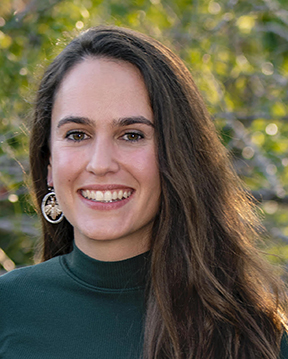
 back to all news
back to all news
Katelyn Heflin: Making zero waste goals more accessible for local municipalities

Second-year University of Michigan School for Environment and Sustainability (SEAS) master’s student Katelyn Heflin was one of nine graduate students last summer who advanced sustainability-related projects in local Michigan communities as a Catalyst Leadership Circle Fellow. Her project was based in Holland, Michigan, and involved developing and implementing educational materials promoting the carbon and local economic benefits of recycling for local waste management and decarbonization campaigns. Heflin worked closely with the city’s sustainability manager, Dan Broersma, to revamp the city’s public-facing communications around recycling.

The Catalyst Leadership Circle Fellowship, funded by the Michigan Department of Environment, Great Lakes, and Energy (EGLE) and administered through Michigan Green Communities and the University’s Graham Sustainability Institute, provides structure and funding for a summer internship program to select graduate students throughout the state. The program connects graduate students with participating municipalities who have shown sustainability leadership to work on small-scale, local government sustainability projects. The projects within the Fellowship vary by municipality and student interest, but each addresses a specific need in the community that Fellows can work to tackle.
Heflin specializes in Environmental Policy and Planning at SEAS, and arrived in Ann Arbor after working in the clean energy and recycling sectors and focusing on international studies at Texas A&M University. She is particularly interested in materials management and recycling policy, and was able to gain invaluable professional and networking experience during her time working as a Catalyst Leadership Fellow.
“The project consisted mostly of developing these waste management and recycling educational materials in English and Spanish,” Heflin said. “My audience was the people who live and work in Holland, and the materials were designed to help residents understand the impact their recycling habits have on the local economy and environment with the hope of increasing participation.”
That included doing research into what grants the city could apply for to help start new recycling programs. In addition to the educational materials created for City of Holland residents, Heflin developed an easy-to-implement “Reuse, Recycle Starter Kit” tailored to local government employees. This packet of informational material, repackaged for city sustainability planners, offers guidance for making more effective decisions on waste management policies and points to funding opportunities and grants to aid in expanding recycling programs.
“I wanted this work to focus on super-tangible things city staffers can do to make the biggest impact,” Heflin noted. As the project advanced and Heflin learned more about the challenges Holland faced in expanding recycling programs, a new dimension of the project emerged: recycling for multi-family housing units. This would become a key section of Heflin’s Reuse, Recycle Starter kit. “Multi-family housing recycling is super high-impact, so I wanted to help create momentum for city staff to take the first step in exploring expanding their recycling programs here,” she said.
Heflin’s prior work experience, SEAS professional network, and environmental policy classes helped her advance this project and contributed to its success. “It was great to experience how sustainability can be incorporated into so many aspects of city operations,” she said. “There is a huge range of municipal projects falling under the sustainability umbrella. Cities are really important agents of resiliency, because they can move faster than state or federal projects.”
She is excited to integrate her newfound experience working in the fast-paced environment of a municipal government’s materials management division to develop sustainable recycling policy and build a more circular future for local governments and communities.

